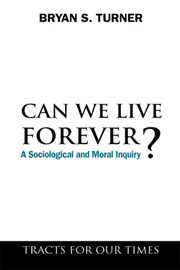Book contents
- Frontmatter
- Contents
- Acknowledgements
- Can We Live Forever?
- Chapter One Longevity and the Population Debate
- Chapter Two The Social Utopia of Human Perfection
- Chapter Three Ancient and Modern Techniques of Longevity
- Chapter Four The Political Economy of Ageing
- Chapter Five The Moral and Spiritual Character of Old Age
- Chapter Six Vulnerability and the Ethic of Care
- Chapter Seven Towards a New Paradigm of Ageing
- Chapter Eight The Aesthetics of Ageing
- Bibliography
- Index
Chapter Six - Vulnerability and the Ethic of Care
Published online by Cambridge University Press: 05 March 2012
- Frontmatter
- Contents
- Acknowledgements
- Can We Live Forever?
- Chapter One Longevity and the Population Debate
- Chapter Two The Social Utopia of Human Perfection
- Chapter Three Ancient and Modern Techniques of Longevity
- Chapter Four The Political Economy of Ageing
- Chapter Five The Moral and Spiritual Character of Old Age
- Chapter Six Vulnerability and the Ethic of Care
- Chapter Seven Towards a New Paradigm of Ageing
- Chapter Eight The Aesthetics of Ageing
- Bibliography
- Index
Summary
What does not kill me makes me stronger.
— Friedrich Nietzsche, Twilight of the Idols, 23Introduction: Vulnerability, Precariousness and the Body
In thinking about the human condition, we must keep in mind four fundamental aspects of our existence that follow from our embodiment: the vulnerability of human beings as embodied creatures, the dependency of humans (especially during their early childhood development), the general reciprocity or interconnectedness of social life and finally, the precariousness of social institutions. There is a dialectical relationship between these four components that becomes obvious when one thinks about the process of technological modernization. Within this dialectical balance between vulnerability, dependency, reciprocity and precariousness, modern technologies, especially medical technology, have powerful, unpredictable and far-reaching implications, and they are largely disruptive of the relationship between the four components. If our embodiment is the real source of our common sociability, then changes to embodiment must have significant implications for both vulnerability and interconnectedness. The new microbiological revolution in medical sciences holds out the promise of long life and rejuvenation, but the prospect of living forever is driven by a powerful commercial logic and has (largely unrecognized) military and security applications and implications that are problematic for human rights and democracy. New medical procedures such as therapeutic cloning, new reproductive technologies, rejuvenative medicine, stem cell research applications, cryonics, fetal surgery and organ transplants create the possibility of a medical utopia, but they also reinforce social divisions and inequalities, especially between rich and poor societies.
- Type
- Chapter
- Information
- Can We Live Forever?A Sociological and Moral Inquiry, pp. 107 - 124Publisher: Anthem PressPrint publication year: 2009



